Jun
21
2019
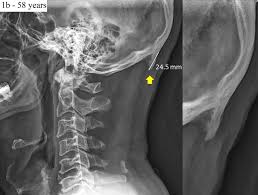 One type of bad science reporting that is very common is reporting the speculation at the end of a study as if it were the finding of the study. For example, the Washington Post headline was, “Horns are growing on young people’s skulls. Phone use is to blame, research suggests.” The research, you may be surprised to learn, had nothing to do with phone use. “Horns” is also a stretch.
One type of bad science reporting that is very common is reporting the speculation at the end of a study as if it were the finding of the study. For example, the Washington Post headline was, “Horns are growing on young people’s skulls. Phone use is to blame, research suggests.” The research, you may be surprised to learn, had nothing to do with phone use. “Horns” is also a stretch.
When I see headlines like that my first questions is always – what did the research actually show? What was the data? In this case the researchers were looking at X-rays of the skull, and particularly at the occipital protuberances. This is a pair of bumps at the back of the head where the posterior neck muscles insert. They found that the risk of having bony spurs or calcifications in the ligaments attaching to the skull (not horns) increased in men, with forward tilt of the head, and in younger subjects. That’s the data. Everything else is the authors speculation about what these results mean.
They argue that the bone spurs are partly a result of the mechanical load on the back of the skull, largely from tilting the head forward. This is reasonable and backed up by some prior research. But the study did not measure phone use. That is pure speculation. It belongs nowhere in the bottom-line headline reporting on the study. Further, a recent systematic review found no clear evidence for increased neck symptoms in mobile phone use. There are many possible factors at work here. Saying that men has slightly more risk than women because men use mobile phones more is a really weak argument. There are many differences that could account for the disparity.
Continue Reading »
Jun
06
2019
 Oh boy. I probably shouldn’t do this, but my “someone is wrong on the internet” instincts are overwhelming me. Tucker Carlson recently had on a guest, James Panero, who essentially repeats the arguments he laid out in this article. Who is Panero? Apparently he is an art critic. I don’t know if he is truly a conspiracy nut, or was just looking for an issue to propel him onto the media for his 15 minutes of fame.
Oh boy. I probably shouldn’t do this, but my “someone is wrong on the internet” instincts are overwhelming me. Tucker Carlson recently had on a guest, James Panero, who essentially repeats the arguments he laid out in this article. Who is Panero? Apparently he is an art critic. I don’t know if he is truly a conspiracy nut, or was just looking for an issue to propel him onto the media for his 15 minutes of fame.
I will also say at this point that I don’t think Carlson is worth responding to. He, in my opinion, is just a highly paid troll catering to an extreme political view. Of course I don’t know what he actually believes, but I wouldn’t assume he believes what he says. Performance art is a more likely hypothesis.
In any case, it doesn’t really matter. He put the arguments out there, complete with factual errors and poor logic, and it’s worth setting the record straight.
Carlson starts:
“Almost every nation on Earth has fallen to tyranny: the metric system,” said Carlson. “From Beijing to Buenos Aires, from Lusaka to London, the people of the world have been forced to measure their environment in millimeters and kilograms. The United States is the only country that is resisted, but we have no reason to be ashamed for using feet and pounds.”
He mispronounces “kilograms” then makes a funny face – performance art. But on to the actual arguments. Panero makes the point that “It was customary units that calibrated the machinery of the Industrial Revolution and took us 240,000 miles to the moon.”
Continue Reading »
Dec
04
2018
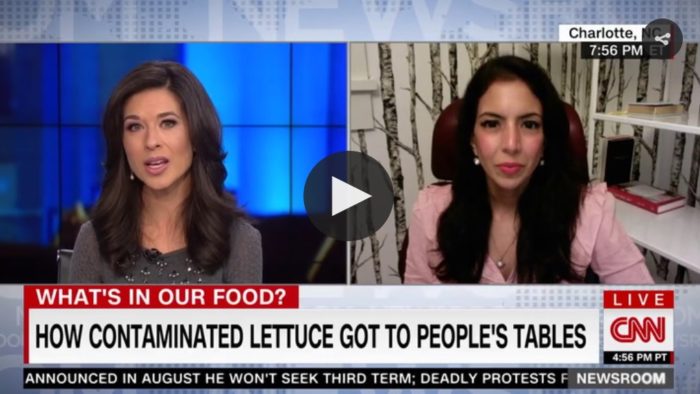 Many people are complaining that CNN, in reporting on the recent E. coli outbreak on romaine lettuce, had The Food Babe (Vani Hari) on as a food “expert.” This, of course, is a complete journalistic failure on the part of CNN. The Food Babe is a famously scientifically illiterate alarmist whose career is based on peddling misinformation. My favorite example is when she completely misunderstood the nature of pressure in airline cabins, and complained that the air was tainted with up to 50% nitrogen.
Many people are complaining that CNN, in reporting on the recent E. coli outbreak on romaine lettuce, had The Food Babe (Vani Hari) on as a food “expert.” This, of course, is a complete journalistic failure on the part of CNN. The Food Babe is a famously scientifically illiterate alarmist whose career is based on peddling misinformation. My favorite example is when she completely misunderstood the nature of pressure in airline cabins, and complained that the air was tainted with up to 50% nitrogen.
As important as this complete scientific failure, was her response. She did not transparently correct the misinformation and apologize. She simply deleted the post.
Hari has come under extensive criticism for spouting her nonsense and fearmongering. She is perhaps most famous for her “yoga mat” stunt, completely misunderstanding the fact that chemicals can be used for a variety of reasons, and that does not make them dangerous.
Her general response to criticism is to (in addition to hiding) go on the attack. She does not appear to be an honest broker of information, but rather a self-promoter who will attack her critics. She also likes to ban critics from her own page. So when the internet complained to CNN that the Food Babe was not an appropriate person to have on their program to be presented as an expert, Hari did what she does – she went on the attack.
Her tactic this time is to blame the whole affair on “astroturfing.” This is a real phenomenon in which an industry, company, cult, or ideological group will create the impression of a grassroots campaign using front organizations and paid agents. However, this isn’t the whole story.
Continue Reading »
Nov
08
2018
 We are heading into cold and flu season, so Time magazine decided to helpfully tell us what the science says about echinacea and the common cold. Unfortunately, they completely bungled their report, getting the bottom line wrong. Exactly where they go wrong, however, is extremely common and instructive.
We are heading into cold and flu season, so Time magazine decided to helpfully tell us what the science says about echinacea and the common cold. Unfortunately, they completely bungled their report, getting the bottom line wrong. Exactly where they go wrong, however, is extremely common and instructive.
The terrible article is partly not the fault of the author. They spoke to experts and tried to do a balanced piece. Unfortunately, there are experts out there who are biased and just wrong. The author was not able to make sense of the evidence themselves, and so they helplessly just passed along whatever nonsense they were told. This is another manifestation of the infiltration of “alternative” medicine into our system – there are always going to be “experts” out there who are just alternative cranks, but they will get quoted along side more serious scientists.
For example, they write:
Other experts say there is evidence that echinacea can be helpful. “Echinacea is popular because it does work for at least some people,” says Kelly Kindscher, a professor of environmental studies at the University of Kansas who has written a textbook on echinacea. While some clinical trials have not shown echinacea to be effective, Kindscher says others have found benefits.
I understand listening to someone who wrote a textbook on the topic, but this conclusion flies in the face of published reviews. The next statement shows where they go wrong:
A 2010 study published in the Annals of Internal Medicine compared echinacea to a placebo and to no treatment at all. It found evidence that echinacea outperformed both when it came to reducing the duration of the common cold — but these benefits were too small to be considered statistically significant.
Continue Reading »
Sep
10
2018
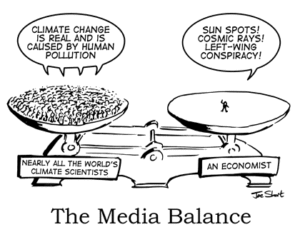 In 2014 the BBC announced a policy change – that it would train its journalists to avoid false balance when reporting science news. This was a welcome policy change, but apparently execution has not achieved the desired results. In a recent training brief the BBC admits it often gets its science reporting wrong, falling for false balance. This is especially true when reporting on climate change.
In 2014 the BBC announced a policy change – that it would train its journalists to avoid false balance when reporting science news. This was a welcome policy change, but apparently execution has not achieved the desired results. In a recent training brief the BBC admits it often gets its science reporting wrong, falling for false balance. This is especially true when reporting on climate change.
Balanced reporting simply refers to the journalistic standard of fairly and proportionately representing all sides in a legitimate debate. This strongly applies to political reporting, where there are often literally two sides, and neither side is objectively right or wrong. Even when one side has the better case, many news outlets take a neutral journalistic stance, simply reporting what each side claims. They relegate taking a side to the editorial and opinion pages, while sticking to the facts in their news pages.
False balance refers to the practice of reporting two or more sides to a controversy as if they are equivalent when they are objectively not. This mostly applies to science reporting, where opinion plays far less of a role than politics. The BBC affirmed in 2014 what critics of mainstream science reporting have been saying for decades – good science journalism does not present all sides in a balanced way, but rather reports different views in a proportional way, depending on the consensus of scientific opinion. That is a far more accurate way to report science news.
So, if 99.9% of geologists and other scientists accept the consensus interpretation of the scientific evidence that plate tectonics is the only valid scientific theory regarding the dynamics of the Earth’s crust, science journalists should not feel obligated to report on the alternate theory of the hollow Earthers every time they report on a related news item. They also do not have to mention, every time they show a NASA photo or video of a spherical Earth, that there are those who contend the Earth is actually flat.
Continue Reading »
Jul
31
2018
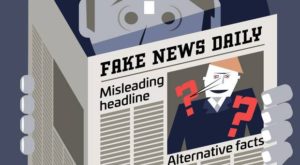 I encounter a range of opinions regarding the current state of politics and misinformation. At one extreme are those who argue for what I think is a false equivalence – politicians have always lied, the news has always been fake, there is nothing to see here. At the other end are those who argue that social media has changed everything.
I encounter a range of opinions regarding the current state of politics and misinformation. At one extreme are those who argue for what I think is a false equivalence – politicians have always lied, the news has always been fake, there is nothing to see here. At the other end are those who argue that social media has changed everything.
I think reality is somewhere in the middle. Lying politicians and biased journalism have existed as long as there have been politicians and journalism. But social media has fundamentally changed the dynamic, and we have yet to adapt to the new world we have created.
This appears to primarily be a problem in societies that are based on open democracy. Ironically our freedoms have been weaponized against us. Russia interfering with the 2016 election is only the most obvious example, and is perhaps not the worst or most pernicious.
The Role of Social Media
While social media is a fantastic tool for communication and accessing information, it has some vulnerabilities. Traditional media had to build a brick-and-mortar infrastructure in order to have societal penetration, and that infrastructure was often built over years. This model favored, at least to an extent, quality control. If a news outlet was persistently wrong, or “tabloid” in its style, it was relegated to the supermarket checkout lane.
Continue Reading »
May
07
2018
 Amid a continuous stream of terrible science news reporting, this one stands out from MSN: ‘Miracle’ Boy Wakes After Parents Sign Organ Donation Papers and Days of Being Brain-Dead. Actually the story is based on a local Fox news report. Everyone involved in these stories should be placed in the journalists penalty box.
Amid a continuous stream of terrible science news reporting, this one stands out from MSN: ‘Miracle’ Boy Wakes After Parents Sign Organ Donation Papers and Days of Being Brain-Dead. Actually the story is based on a local Fox news report. Everyone involved in these stories should be placed in the journalists penalty box.
This is a standard fluff narrative that comes up regularly – the person who wakes unexpectedly from a coma, or better yet, after being declared brain dead. There is a common pattern to the stories – you never get enough details to know what actually happened, but what details you do get do not hang together.
The basic facts of the case are this, 13-year-old Trenton McKinley of Mobile Alabama was injured in a dune buggy accident. He suffered severe head injury. Apparently his prognosis was so poor at one point that the doctors talked with his parents about organ donation, and they agreed that if his heart stopped they would go through the organ donation procedure. In other words, they would harvest his organs.
However, before that happened Trenton began to show signs of improvement. He started to move, and then to become conscious. He is now in rehab, able to talk, and to walk with assistance.
Continue Reading »
May
04
2018
 We have yet another example of a scientifically complex study being mangled by the mainstream media, who simply do not have the chops to provide an adequate analysis. The Telegraph reports:
We have yet another example of a scientifically complex study being mangled by the mainstream media, who simply do not have the chops to provide an adequate analysis. The Telegraph reports:
Fresh fears have been raised over the role of mobile phones in brain cancer after new evidence revealed rates of a malignant type of tumour have doubled in the last two decades.
They further report about the study:
They analysed 79,241 malignant brain tumours over 21 years, finding that cases of GBM in England have increased from around 1,250 a year in 1995 to just under 3,000.
This sounds alarming. The mainstream reporting was not horrible (unlike some of the fearmongering by advocacy groups) but was completely inadequate to really put this study into context. The Science Media Center put together analysis from various experts, and the entire page is worth a read. It is a good demonstration of how to really analyze a scientific paper.
The Telegraph article does point out that this new study is looking at brain cancer incidence only, and did not present any data that correlates the risk of brain cancer with any specific risk factor. The paper only speculates about possible causes, including the rise in cell phone use. But that is just scratching the surface.
Continue Reading »
Mar
19
2018
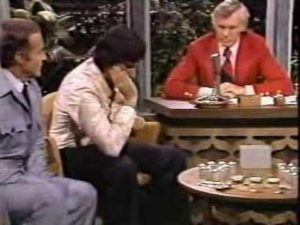 In the 1970s and 80s belief in the paranormal was the most common target of skeptics. Topics like extrasensory perception (ESP), astrology, and faith healing were at the top of the list of skeptical concerns. In the last 30 years skepticism has evolved quite a bit, and while we never stopped being watchdogs on paranormal beliefs and other pseudosciences, they did mostly fade into the background. Other topics, such as science denial and the rise of fake news, took center stage.
In the 1970s and 80s belief in the paranormal was the most common target of skeptics. Topics like extrasensory perception (ESP), astrology, and faith healing were at the top of the list of skeptical concerns. In the last 30 years skepticism has evolved quite a bit, and while we never stopped being watchdogs on paranormal beliefs and other pseudosciences, they did mostly fade into the background. Other topics, such as science denial and the rise of fake news, took center stage.
But history has shown that there is often a cycle to such things. Interest in UFOs has waxed and waned over the years, for example, never going away completely, but fading and then rising again to prominence as a new generation discovers the topic.
Still, we do like to think we are making some progress through exposure and education. We have tried to interact frequently with the press so that at least the skeptical point of view will get better exposure when such topics are addressed. One solid victory was when the BBC announced they will no longer follow a pattern of false balance when dealing with science denial – putting a crank up against the consensus of scientific opinion as if they were equal.
A recent episode of CBS Sunday Morning about ESP, however, was worse than false balance, it was a throwback to the early days of credulous reporting about the paranormal with only token skepticism. Not that token skepticism was gone, but it has become more rare, especially from a major network or news outlet.
The piece, by Erin Moriarty, is a complete journalistic fail. It was the kind of piece we used to see thirty plus years ago before the skeptical movement had any traction. It is a perfect example of what we call token skepticism – a piece that is utterly gullible except for a very brief talking head skeptic who says something generic, like, “There is no scientific evidence to support this.” The token skepticism is immediately negated, however, by some response from the true-believer, a response the skeptic is never allowed to respond to in turn.
Continue Reading »
Feb
27
2018
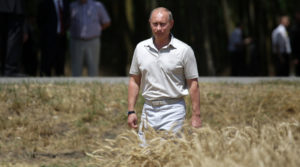 A recent study finds that Russia is using its social media propaganda methods to stir up controversy over genetically modified organisms (GMOs). Why would Russia want to do this? This partly goes back to Lysenko.
A recent study finds that Russia is using its social media propaganda methods to stir up controversy over genetically modified organisms (GMOs). Why would Russia want to do this? This partly goes back to Lysenko.
But perhaps the real story here is the mechanism that Russia is using to stir the anti-GMO pot – weaponizing the free flow of information and ideas.
The Revenge of Lysenko
If you recall from my previous article, Lysenko was essentially a crank scientist who used his political influence to decimate the Soviet agricultural industry. It is a great historical example of the triumph of ideology over science, and an important cautionary tale. Continue Reading »
 One type of bad science reporting that is very common is reporting the speculation at the end of a study as if it were the finding of the study. For example, the Washington Post headline was, “Horns are growing on young people’s skulls. Phone use is to blame, research suggests.” The research, you may be surprised to learn, had nothing to do with phone use. “Horns” is also a stretch.
One type of bad science reporting that is very common is reporting the speculation at the end of a study as if it were the finding of the study. For example, the Washington Post headline was, “Horns are growing on young people’s skulls. Phone use is to blame, research suggests.” The research, you may be surprised to learn, had nothing to do with phone use. “Horns” is also a stretch.
 Oh boy. I probably shouldn’t do this, but my “someone is wrong on the internet” instincts are overwhelming me. Tucker Carlson
Oh boy. I probably shouldn’t do this, but my “someone is wrong on the internet” instincts are overwhelming me. Tucker Carlson  Many
Many We are heading into cold and flu season, so
We are heading into cold and flu season, so  In 2014 the BBC
In 2014 the BBC  I encounter a range of opinions regarding the current state of politics and misinformation. At one extreme are those who argue for what I think is a false equivalence – politicians have always lied, the news has always been fake, there is nothing to see here. At the other end are those who argue that social media has changed everything.
I encounter a range of opinions regarding the current state of politics and misinformation. At one extreme are those who argue for what I think is a false equivalence – politicians have always lied, the news has always been fake, there is nothing to see here. At the other end are those who argue that social media has changed everything. Amid a continuous stream of terrible science news reporting, this one stands out from MSN:
Amid a continuous stream of terrible science news reporting, this one stands out from MSN: We have yet another example of a scientifically complex study being mangled by the mainstream media, who simply do not have the chops to provide an adequate analysis.
We have yet another example of a scientifically complex study being mangled by the mainstream media, who simply do not have the chops to provide an adequate analysis.  In the 1970s and 80s belief in the paranormal was the most common target of skeptics. Topics like extrasensory perception (ESP), astrology, and faith healing were at the top of the list of skeptical concerns. In the last 30 years skepticism has evolved quite a bit, and while we never stopped being watchdogs on paranormal beliefs and other pseudosciences, they did mostly fade into the background. Other topics, such as science denial and the rise of fake news, took center stage.
In the 1970s and 80s belief in the paranormal was the most common target of skeptics. Topics like extrasensory perception (ESP), astrology, and faith healing were at the top of the list of skeptical concerns. In the last 30 years skepticism has evolved quite a bit, and while we never stopped being watchdogs on paranormal beliefs and other pseudosciences, they did mostly fade into the background. Other topics, such as science denial and the rise of fake news, took center stage. A recent study
A recent study




